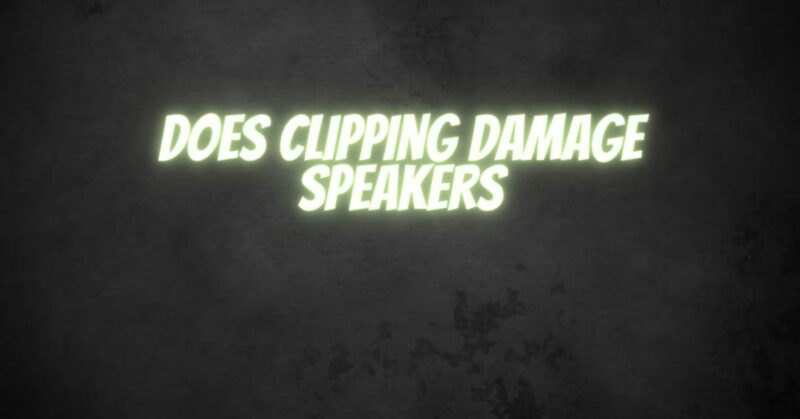Clipping is a common issue that can occur when an audio system is pushed beyond its limits. It is often accompanied by distorted sound and compromised audio quality. One concern that arises when discussing clipping is whether it can damage speakers. In this article, we will explore the effects of clipping on speakers and shed light on the potential risks involved.
Understanding Clipping:
Clipping occurs when an amplifier or audio system attempts to amplify an audio signal beyond its maximum capability. As a result, the amplified waveform is truncated, with the peaks of the signal being “clipped” or flattened. This distortion alters the original audio signal, leading to a harsh and distorted sound.
Effects of Clipping on Speakers:
1. Increased Heat:
One of the primary concerns with speaker clipping is the increased heat generated. When an amplifier is driven into clipping, it continuously sends a high-powered signal to the speakers. This sustained delivery of excessive power causes the voice coils in the speakers to generate additional heat. Prolonged exposure to high temperatures can potentially damage the voice coils and other components of the speakers.
2. Overexcursion:
Clipping can also result in overexcursion of the speaker diaphragm. When an amplifier clips, it sends distorted signals with abrupt voltage changes to the speakers. This can cause the speaker cone or diaphragm to move erratically and beyond its designed limits. Overexcursion puts stress on the speaker’s mechanical components, potentially leading to damage or even driver failure.
3. Increased Distortion:
Clipping itself introduces significant distortion into the audio signal. While this distortion is primarily perceived audibly, it can also have an impact on the speaker’s physical components. The additional strain caused by the distorted signal can gradually degrade the speaker’s performance and longevity over time.
Preventing Speaker Damage from Clipping:
1. Proper Gain and Volume Settings:
Setting the gain and volume levels correctly is crucial in preventing clipping. Avoid pushing the amplifier or audio system to its maximum limits, as this increases the risk of clipping. Adjust the gain and volume controls to appropriate levels that allow the speakers to operate within their intended range without distortion.
2. High-Quality Amplification:
Using a high-quality amplifier that matches the power requirements of the speakers is essential. A well-matched amplifier ensures clean and undistorted power delivery, minimizing the likelihood of clipping. Quality amplification can also provide additional protection mechanisms, such as built-in limiters, to safeguard the speakers.
3. Monitoring Audio Levels:
Regularly monitoring audio levels during playback is important in preventing clipping. Be aware of excessive volume levels or audio sources with variable volume outputs. Keep the volume at a comfortable level that does not strain the speakers or push them beyond their limits.
4. Upgrading Speakers:
If you frequently encounter clipping issues, consider upgrading to speakers that can handle higher power levels. Speakers with higher power handling capacities and efficient designs are less prone to distortion and damage from clipping.
Conclusion:
Clipping can have detrimental effects on speakers if left unaddressed. Increased heat, overexcursion, and increased distortion are the primary risks associated with clipping. However, by implementing proper gain and volume settings, using high-quality amplification, monitoring audio levels, and considering speaker upgrades, you can minimize the potential for speaker damage. Maintaining a balanced and distortion-free audio system not only preserves the quality of your sound but also safeguards the longevity of your speakers.


